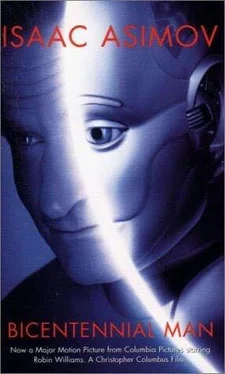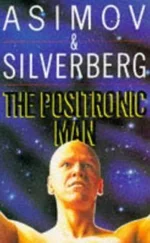Isaac Asimov - The Bicentennial Man and Other Stories
Здесь есть возможность читать онлайн «Isaac Asimov - The Bicentennial Man and Other Stories» весь текст электронной книги совершенно бесплатно (целиком полную версию без сокращений). В некоторых случаях можно слушать аудио, скачать через торрент в формате fb2 и присутствует краткое содержание. Год выпуска: 1976, ISBN: 1976, Издательство: Doubleday science fiction, Жанр: Фантастика и фэнтези, на английском языке. Описание произведения, (предисловие) а так же отзывы посетителей доступны на портале библиотеки ЛибКат.
- Название:The Bicentennial Man and Other Stories
- Автор:
- Издательство:Doubleday science fiction
- Жанр:
- Год:1976
- ISBN:ISBN: 0-385-12198-9
- Рейтинг книги:4 / 5. Голосов: 1
-
Избранное:Добавить в избранное
- Отзывы:
-
Ваша оценка:
- 80
- 1
- 2
- 3
- 4
- 5
The Bicentennial Man and Other Stories: краткое содержание, описание и аннотация
Предлагаем к чтению аннотацию, описание, краткое содержание или предисловие (зависит от того, что написал сам автор книги «The Bicentennial Man and Other Stories»). Если вы не нашли необходимую информацию о книге — напишите в комментариях, мы постараемся отыскать её.
The Bicentennial Man and Other Stories — читать онлайн бесплатно полную книгу (весь текст) целиком
Ниже представлен текст книги, разбитый по страницам. Система сохранения места последней прочитанной страницы, позволяет с удобством читать онлайн бесплатно книгу «The Bicentennial Man and Other Stories», без необходимости каждый раз заново искать на чём Вы остановились. Поставьте закладку, и сможете в любой момент перейти на страницу, на которой закончили чтение.
Интервал:
Закладка:
“Then we are through.” Bergen shrugged. “I need not tell you that neither absolute certainty nor absolute safety exists. You have to live with some risk and the chance of double and simultaneous failure is so microscopically small that it can be lived with easily.”
“If all your mechanical contrivances fail—”
“They fail safe,” said Bergen stubbornly.
Demerest nodded. He finished the last of his chicken. Mrs. Bergen was already beginning to clean up. “You’ll pardon my questions, Mr. Bergen, I hope.”
“You’re welcome to ask. I wasn’t informed, actually, as to the precise nature of your mission here. ‘Fact finding’ is a weasel phrase. However, I assume there is keen distress on the Moon over the recent disaster and as safety engineer you rightly feel the responsibility of correcting whatever shortcomings exist and would be interested in learning, if possible, from the system used in Ocean-Deep.”
“Exactly. But, see here, if all your automatic contrivances fail safe for some reason, for any reason, you would be alive, but all your escape-hatch mechanisms would be sealed permanently shut. You would be trapped inside Ocean-Deep and would exchange a slow death for a fast one.”
“It’s not likely to happen but we’d hope we could make repairs before our air supply gave out. Besides we do have a manual backup system.”
“Oh?”
“Certainly. When Ocean-Deep was first established and this was the only unit—the one we’re sitting in now—manual controls were all we had. That was unsafe, if you like. There they are, right behind you—covered with friable plastic.”
“In emergency, break glass,” muttered Demerest, inspecting the covered setup.
“Pardon me?”
“Just a phrase commonly used in ancient fire-fighting systems. . . . Well, do the manuals still work, or has the system been covered with your friable plastic for twenty years to the point where it has all decayed into uselessness with no one noticing?”
“Not at all. It’s periodically checked, as all our equipment is. That’s not my job personally, but I know it is done. If any electrical or electronic circuit is out of its normal working condition, lights flash, signals sound, everything happens but a nuclear blast. . . . You know, Mr. Demerest, we are as curious about Luna City as you are about Ocean-Deep. I presume you would be willing to invite one of our young men—”
“How about a young woman?” interposed Annette at once.
“I am sure you mean yourself, dear,” said Bergen, “to which I can only answer that you are determined to have a baby here and to keep it here for a period of time after birth, and that effectively eliminates you from consideration.”
Demerest said stiffly, “We hope you will send men to Luna City. We are anxious to have you understand our problems.”
“Yes, a mutual exchange of problems and of weeping on each other’s shoulders might be of great comfort to all. For instance, you have one advantage on Luna City that I wish we could have. With low gravity and a low pressure differential, you can make your caverns take on any irregular and angular fashion that appeals to your aesthetic sense or is required for convenience. Down here we’re restricted to the sphere, at least for the foreseeable future, and our designers develop a hatred for the spherical that surpasses belief. Actually it isn’t funny. It breaks them down. They eventually resign rather than continue to work spherically.”
Bergen shook his head and leaned his chair back against a microfilm cabinet. “You know,” he continued, “when William Beebe built the first deep-set chamber in history in the 1930s—it was just a gondola suspended from a mother ship by a half-mile cable, with no buoyancy chambers and no engines, and if the cable broke, good night, only it never did. . . . Anyway, what was I saying? Oh, when Beebe built his first deep-sea chamber, he was going to make it cylindrical; you know, so a man would fit in it comfortably. After all, a man is essentially a tall, skinny cylinder. However, a friend of his argued him out of that and into a sphere on the very sensible grounds that a sphere would resist pressure more efficiently than any other possible shape. You know who that friend was?”
“No, I’m afraid I don’t.”
“The man who was President of the United States at the time of Beebe’s descents—Franklin D. Roosevelt. All these spheres you see down here are the great-grandchildren of Roosevelt’s suggestion.”
Demerest considered that briefly but made no comment. He returned to the earlier topic. “We would particularly like someone from Ocean-Deep,” he said, “to visit Luna City because it might lead to a great enough understanding of the need, on Ocean-Deep’s part, for a course of action that might involve considerable self-sacrifice.”
“Oh?” Bergen’s chair came down flat-leggedly on all fours. “How’s that?”
“Ocean-Deep is a marvelous achievement; I wish to detract nothing from that. I can see where it will become greater still, a wonder of the world. Still—”
“Still?”
“Still, the oceans are only a part of the Earth; a major part, but only a part. The deep sea is only part of the ocean. It is inner space indeed; it works inward, narrowing constantly to a point.”
“I think,” broke in Annette, looking rather grim, “that you’re about to make a comparison with Luna City.”
“Indeed I am,” said Demerest. “Luna City represents outer space, widening to infinity. There is nowhere to go down here in the long run; everywhere to go out there.”
“We don’t judge by size and volume alone, Mr. Demerest,” said Bergen. “The ocean is only a small part of Earth, true, but for that very reason it is intimately connected with over five billion human beings. Ocean-Deep is experimental but the settlements on the continental shelf already deserve the name of cities. Ocean-Deep offers mankind the chance of exploiting the whole planet—”
“Of polluting the whole planet,” broke in Demerest excitedly. “Of raping it, of ending it. The concentration of human effort to Earth itself is unhealthy and even fatal if it isn’t balanced by a turning outward to the frontier.”
“There is nothing at the frontier,” said Annette, snapping out the words. “The Moon is dead, all the other worlds out there are dead. If there are live worlds among the stars, light-years away, they can’t be reached. This ocean is living.”
“The Moon is living, too, Mrs. Bergen, and if Ocean-Deep allows it, the Moon will become an independent world. We Moon-men will then see to it that other worlds are reached and made alive and, if mankind but has patience, we will reach the stars. We! We! It is only we Moon-men, used to space, used to a world in a cavern, used to an engineered environment, who could endure life in a spaceship that may have to travel centuries to reach the stars.”
“Wait, wait, Demerest,” said Bergen, holding up his hand. “Back up! What do you mean, if Ocean-Deep allows it? What have we to do with it?”
“You’re competing with us, Mr. Bergen. The Planetary Project Commission will swing your way, give you more, give us less, because in the short term, as your wife says, the ocean is alive and the Moon, except for a thousand men, is not; because you are a half-dozen miles away and we a quarter of a million; because you can be reached in an hour and we only in three days. And because you have an ideal safety record and we have had—misfortunes.”
“The last, surely, is trivial. Accidents can happen any time, anywhere.”
“But the trivial can be used,” said Demerest angrily. “It can be made to manipulate emotions. To people who don’t see the purpose and the importance of space exploration, the death of Moon-men in accidents is proof enough that the Moon is dangerous, that its colonization is a useless fantasy. Why not? It’s their excuse for saving money and they can then salve their consciences by investing part of it in Ocean-Deep instead. That’s why I said the accident on the Moon had threatened the survival of Luna City even though it killed only twenty people out of nearly a thousand.”
Читать дальшеИнтервал:
Закладка:
Похожие книги на «The Bicentennial Man and Other Stories»
Представляем Вашему вниманию похожие книги на «The Bicentennial Man and Other Stories» списком для выбора. Мы отобрали схожую по названию и смыслу литературу в надежде предоставить читателям больше вариантов отыскать новые, интересные, ещё непрочитанные произведения.
Обсуждение, отзывы о книге «The Bicentennial Man and Other Stories» и просто собственные мнения читателей. Оставьте ваши комментарии, напишите, что Вы думаете о произведении, его смысле или главных героях. Укажите что конкретно понравилось, а что нет, и почему Вы так считаете.












